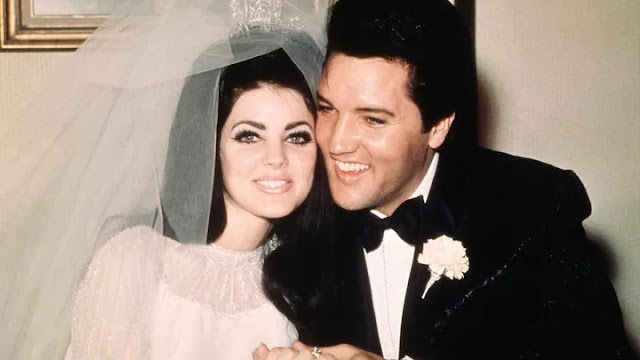In a dramatic turn of events, Priscilla Presley, the former wife of the legendary rock ‘n’ roll icon Elvis Presley, has publicly denied any involvement in his untimely death in 1977, following accusations tied to a staggering $50 million lawsuit. The claims, which surfaced recently, have reignited public interest in the circumstances surrounding Elvis’s passing, a topic that has long been shrouded in speculation, conspiracy theories, and heartbreak for millions of fans worldwide. Priscilla’s response comes as a firm rebuttal to what she and her legal team describe as baseless and defamatory accusations, aimed at tarnishing her reputation and exploiting the enduring legacy of the King of Rock ‘n’ Roll.
The Lawsuit and Its Allegations
The $50 million lawsuit, filed by an undisclosed party, alleges that Priscilla Presley played a role in the events leading to Elvis’s death on August 16, 1977, at the age of 42. While specific details of the lawsuit remain limited, sources indicate that the claims center on alleged negligence or misconduct related to Elvis’s well-documented struggles with prescription drug dependency, which ultimately contributed to his fatal heart attack. The plaintiff reportedly asserts that Priscilla, as one of the closest figures in Elvis’s life during their marriage, either failed to intervene adequately or contributed to an environment that exacerbated his health issues.
These accusations have sent shockwaves through the entertainment world, prompting Priscilla, now 80 years old, to issue a public statement through her legal representatives. In her response, she categorically denied any wrongdoing, describing the lawsuit as a “vicious and unfounded attack” on her character. “These claims are completely false and designed to exploit my connection to Elvis for financial gain,” Priscilla stated. “I loved Elvis deeply, and I have spent my life preserving his legacy and honoring his memory. To suggest otherwise is not only hurtful but an insult to the truth.”
The lawsuit has also raised questions about the motivations behind the claims, with some speculating that it may be an attempt to capitalize on the renewed interest in Elvis Presley’s life following recent biopics, documentaries, and exhibitions celebrating his career. The timing of the lawsuit, nearly five decades after Elvis’s death, has sparked debates about its legitimacy and whether it seeks to exploit the enduring fascination with one of music’s most iconic figures.
Elvis and Priscilla: A Love Story Under Scrutiny
To fully understand the context of these allegations, it’s essential to revisit the relationship between Elvis and Priscilla Presley, a romance that captivated the world and remains one of the most scrutinized in entertainment history. Elvis first met Priscilla Beaulieu in 1959, when she was just 14 years old and he was 24, stationed in Germany during his military service. The daughter of a U.S. Army officer, Priscilla was living with her family in Wiesbaden when she caught the attention of the already world-famous singer. Their relationship, which began as a friendship, evolved into a courtship that sparked both admiration and controversy due to their age difference.
The couple married in 1967, after years of long-distance communication and visits. Their daughter, Lisa Marie Presley, was born the following year, solidifying their status as one of America’s most high-profile families. However, their marriage faced significant challenges, including Elvis’s demanding career, his struggles with fame, and his increasing reliance on prescription medications. By 1973, the couple had divorced, though they maintained a cordial relationship and co-parented Lisa Marie until Elvis’s death.
Priscilla’s role in Elvis’s life extended beyond their marriage. After his passing, she became a steward of his legacy, most notably through her transformation of Graceland, Elvis’s Memphis estate, into a world-renowned museum and tourist attraction. Her efforts helped preserve Elvis’s music, image, and cultural impact for future generations, earning her both praise and criticism from fans and observers. Some have lauded her for her business acumen and dedication, while others have accused her of commercializing Elvis’s legacy for personal gain—a narrative that the recent lawsuit appears to echo.
The Circumstances of Elvis Presley’s Death
Elvis Presley’s death on August 16, 1977, remains one of the most devastating moments in music history. Found unresponsive on the floor of his Graceland mansion by his fiancée Ginger Alden, Elvis was pronounced dead at 3:30 p.m. The official coroner’s report attributed his death to cardiac arrhythmia, an irregular and ineffective heartbeat, exacerbated by his chronic health issues and long-term use of prescription drugs. Toxicology reports revealed multiple medications in his system, including painkillers, sedatives, and anti-anxiety drugs, though the exact role these substances played in his death has been a matter of debate.
At the time, Elvis’s health had been in decline for years. His grueling tour schedules, coupled with the pressures of fame, contributed to physical and mental exhaustion. Reports from those close to him described a man battling insomnia, chronic pain, and emotional turmoil, often turning to prescription medications to cope. While Elvis’s inner circle, including his doctors and entourage, faced scrutiny for enabling his dependency, Priscilla was not living with him at the time of his death, having divorced him four years earlier.
The lawsuit’s allegations that Priscilla bore responsibility for Elvis’s death appear to hinge on her influence during their marriage and her awareness of his struggles. Critics of the claims argue that holding Priscilla accountable for events that occurred years after their divorce is both unfair and legally tenuous. Supporters of Priscilla point out that she was not directly involved in Elvis’s day-to-day life in 1977 and that his medical care was managed by a team of professionals, including his personal physician, Dr. George Nichopoulos, famously known as “Dr. Nick.”
Priscilla’s Response and Legal Strategy
In her public statement, Priscilla expressed profound sadness over the accusations, emphasizing her lifelong commitment to honoring Elvis’s memory. “Elvis was the love of my life, and his loss was a tragedy that I have carried with me every day,” she said. “To face these accusations now, after all these years, is not only painful but an attempt to rewrite history for profit.” Her legal team has vowed to fight the lawsuit vigorously, describing it as a “frivolous” claim that lacks credible evidence.
Legal experts suggest that the lawsuit faces significant hurdles. The statute of limitations for most claims related to wrongful death or negligence typically expires within a few years, making a case filed nearly 50 years after the event highly unusual. Furthermore, the plaintiff’s ability to prove a direct link between Priscilla’s actions and Elvis’s death is likely to be challenging, given the complexity of his health issues and the number of individuals involved in his care.
Priscilla’s attorneys have also hinted at the possibility of a countersuit, arguing that the accusations constitute defamation and intentional infliction of emotional distress. They have called for the dismissal of the lawsuit and are seeking to uncover the motives behind the claims, which they believe may be tied to financial opportunism or an attempt to generate publicity.
The Broader Context: Elvis’s Legacy and Ongoing Controversies
The lawsuit against Priscilla Presley is only the latest chapter in the long and complicated saga of Elvis Presley’s legacy. Since his death, Elvis has remained a cultural juggernaut, with his music, films, and image continuing to generate millions of dollars annually. Graceland, managed by Elvis Presley Enterprises (EPE), attracts hundreds of thousands of visitors each year, while his songs remain staples on radio stations and streaming platforms. The 2022 biopic Elvis, directed by Baz Luhrmann, introduced the singer’s story to a new generation, earning critical acclaim and reigniting debates about his life and death.
However, Elvis’s legacy has not been without controversy. Questions about his health, relationships, and the management of his estate have fueled speculation and legal battles for decades. Lisa Marie Presley, who passed away in 2023, faced her own challenges in overseeing EPE and navigating disputes over her father’s estate. The recent lawsuit against Priscilla adds another layer to this complex narrative, raising questions about who has the right to profit from Elvis’s legacy and how his story should be told.
For Priscilla, the accusations come at a time when she has been reflecting on her life and contributions to Elvis’s legacy. In recent years, she has been actively involved in projects celebrating his music, including the Elvis film and various exhibitions at Graceland. Her work has helped keep Elvis’s memory alive, but it has also made her a target for criticism from those who believe she has benefited excessively from her association with him.
Public Reaction and Media Coverage
The news of the lawsuit has sparked widespread discussion on social media and in entertainment circles. On platforms like X, fans of Elvis and Priscilla have expressed outrage over the allegations, with many calling them “absurd” and “disrespectful.” Hashtags such as #JusticeForPriscilla and #ElvisLegacy have trended, reflecting the passionate support for Priscilla among longtime fans. Others, however, have used the opportunity to revisit conspiracy theories about Elvis’s death, including claims that he faked his passing or was the victim of foul play—narratives that have persisted despite a lack of evidence.
Media outlets have approached the story with a mix of skepticism and intrigue. Tabloids have sensationalized the lawsuit, framing it as a bombshell revelation, while more reputable publications have emphasized the lack of clarity surrounding the plaintiff’s identity and the specifics of the claims. Some commentators have suggested that the lawsuit may be part of a broader trend of high-profile legal actions targeting celebrities or their estates, often driven by individuals seeking financial settlements or media attention.
The Cultural Significance of Elvis Presley
To understand why a lawsuit like this generates such intense interest, it’s worth examining the enduring cultural significance of Elvis Presley. Known as the King of Rock ‘n’ Roll, Elvis revolutionized music in the 1950s with his fusion of rockabilly, gospel, blues, and country. Hits like “Hound Dog,” “Jailhouse Rock,” and “Can’t Help Falling in Love” made him a global superstar, while his charismatic stage presence and distinctive voice captivated audiences. Beyond music, Elvis’s films, television appearances, and Las Vegas residencies cemented his status as a cultural icon.
However, Elvis’s life was also marked by personal struggles. His meteoric rise to fame brought immense pressure, leading to issues with substance abuse, weight gain, and deteriorating health. His death at such a young age shocked the world, leaving behind a legacy that continues to inspire and polarize. For many, Elvis represents the quintessential American success story—a poor boy from Tupelo, Mississippi, who became a global phenomenon. For others, his story is a cautionary tale about the dangers of fame and excess.
Priscilla’s role in this narrative is equally complex. As a young woman thrust into the spotlight, she navigated a relationship with one of the world’s most famous men while facing intense public scrutiny. After their divorce, she carved out her own identity as a businesswoman, actress, and author, all while maintaining a connection to Elvis’s legacy. Her efforts to preserve Graceland and promote Elvis’s music have been praised, but they have also invited criticism from those who question her motives.
What’s Next for Priscilla and the Lawsuit?
As the legal battle unfolds, all eyes will be on Priscilla Presley and her response to the $50 million lawsuit. Her legal team is expected to file a motion to dismiss the case, arguing that the claims are untimely and lack merit. If the lawsuit proceeds, it could lead to a high-profile court case, potentially unearthing new details about Elvis’s final years and the dynamics of his inner circle.
For Priscilla, the lawsuit represents not only a personal attack but also a challenge to her decades-long efforts to protect Elvis’s legacy. In her statement, she vowed to continue her work, stating, “I will not allow these false accusations to diminish the love and respect I have for Elvis or the commitment I have to his fans.” Her resolve has resonated with many, who see her as a steadfast guardian of one of music’s greatest legacies.
The broader implications of the lawsuit extend beyond Priscilla and Elvis. It raises questions about the responsibility of loved ones in addressing addiction, the ethics of posthumous lawsuits, and the challenges of managing a celebrity’s estate in the face of public scrutiny. As the case progresses, it will likely fuel further debate about Elvis Presley’s life, death, and enduring impact on popular culture.
Conclusion
The allegations against Priscilla Presley have thrust her back into the spotlight, reigniting discussions about one of the most pivotal moments in music history: the death of Elvis Presley. While the $50 million lawsuit has yet to be fully substantiated, it has already succeeded in stirring controversy and capturing public attention. For Priscilla, the accusations are a painful reminder of the challenges she has faced as a central figure in Elvis’s story. Yet, her response—marked by dignity and determination—underscores her commitment to preserving the memory of the man she loved.
As the legal proceedings move forward, the world will be watching to see how this chapter in the Elvis Presley saga unfolds. For now, Priscilla stands firm, defending her name and the legacy of a man whose music continues to resonate nearly half a century after his passing. Whether the lawsuit is dismissed or escalates into a broader legal battle, it serves as a poignant reminder of the complexities of fame, love, and loss—and the enduring power of Elvis Presley’s legend.






